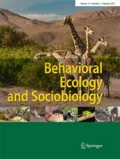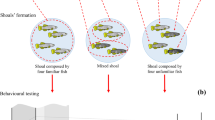Summary
Experiments on shoaling cyprinids hunting for food on patches in tanks demonstrate and advantage of foraging in a group. Individual goldfish (Carassius auratus) and minnows (Phoxinus phoxinus) in a shoal of conspecifics located food more rapidly as shoal size increased from 2 to 20. although shoaling minnows form polarised schools more readily than goldfish, which rarely do so, both species benefited from the trend of speedier food location with increasing group size.
Similar content being viewed by others
References
Bertram BCR (1978) Living in groups: predators and prey. In: Krebs JR, Davies NB (eds) Behavioural ecology. Blackwell, Oxford, pp 64–96
Curio E (1976) The economics of insect sociality. In: Krebs JR, Davies NB (eds) Behavioural ecology. Blackwell, Oxford, pp 97–128
Howell DJ (1979) Flock foraging in nectar-eating bats: advantages to the bats and to the host plants. Am Nat 114:23–49
Kennedy GJA, Pitcher TJ (1975) Experiments on homing in shoals of the European minnow. Trans Am Fish Soc 104:454–457
Krebs JR, MacRoberts MH, Cullen JM (1972) Flocking and feeding in the Great Tit, Parus major—an experimental study. Ibis 114:507–530
Major PF (1978) Predator-prey interactions in two schooling fishes, Caranx ignobilis and Stolephorus purpureus. Anim Behav 26:760–777
Neill SR StJ, Cullen JM (1974) Experiments on whether schooling by their prey affects the hunting behaviour of cephalopods and fish predators. J Zool (Lond) 172:549–569
Pitcher TJ (1979a) The role of schooling in fish capture. International Commission for the Exploration of the Sea. CM 1979/B:15:1–17
Pitcher TJ (1979b) Sensory information and the organisation of behaviour in a shoaling cyprinid. Anim Behav 27:126–149
Pitcher TJ (1980) Some ecological consequences of fish school volumes. Freshwater Biol 10:539–544
Pitcher TJ, Kennedy GJA (1977) The longevity and quality of fin marks made with a jet inoculator. Fish Mgmt 8:16–18
Pitcher TJ, Wyche C (1982) Predator-avoidance tactics of sand-eel schools: why schools may be reluctant to split. Environ Biol Fish (in press)
Robertson DR, Sweatman HPA, Fletcher EA, Cleland MG (1976) Schooling as a means of circumventing the territoriality of competitors. Ecology 57:1208–1220
Welty JC (1934) Experiments on group behaviour of fishes. Physiol Zool 7:185–128
Author information
Authors and Affiliations
Rights and permissions
About this article
Cite this article
Pitcher, T.J., Magurran, A.E. & Winfield, I.J. Fish in larger shoals find food faster. Behav Ecol Sociobiol 10, 149–151 (1982). https://doi.org/10.1007/BF00300175
Received:
Accepted:
Issue Date:
DOI: https://doi.org/10.1007/BF00300175




